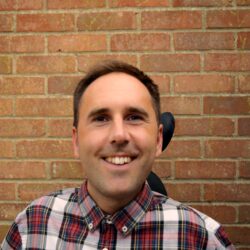Richard is one my best mates. We attended Coventry university together. Had many hilarious and intellectual conversations throughout. Rich is a political genius and I wanted him to write this piece around the recent media coverage of disabled people. I hope you find it interesting, helpful and wanting to question the status quo. Thanks for writing this, bud!
In this article I hope to show the reasons why Shipley MP Philip Davis felt able to make such a disablist statement and how the debate around welfare reform and barriers to employment has taken a wrong turn, before turning to what could be done to improve the situation.
The recent comments by Mr.Davis that those with learning disabilities should be paid less than the minimum wage to encourage employer’s to give those with impairments jobs, has rightly been condemned by activists, charities and by all shades of political opinion. Apart from the comments being deeply offensive, it is my understanding that to pay someone less than the minimum wage is illegal and dare I say it a flagrant degradation of their human rights.
However, I believe the current political climate make such comments acceptable and is further evidence that we are a long way from ridding our society of disablist attitudes. Nothing exemplifies this more than the current debate surrounding welfare reform and barriers to employment.
The harsh rhetoric employed by the media and parroted by politicians of all stripes in a desperate attempt to be seen as tough on welfare , put forward the argument that, whilst protecting those who are most in need, they are going to be tough on those who are fit to work. This is unhelpful and wrongheaded as the recent debacle over the last government fitness to work test highlights.
There is an assumption that being on benefits is an easy life, and that people are happy to be in receipt of welfare. They argue the current benefit system discourages people from finding work. This does not tally with my own experience of being in receipt of benefits. It has long been noted that dependence on the welfare system traps individuals in what has been commonly termed the ‘poverty trap: once caught in the trap of welfare you are more likely to fall into debt in order to meet living costs and suffer from a physical or mental illness’. To those who adhere to the view that being on benefits is an easy life, I would point out who would logically choose to live in poverty with social stigma of being a ‘scrounger’ and constant demonization by the media?
There is also a wide spread myth that benefits are easy to get and the criteria for gaining them is soft, for someone who is eligible for benefits I can state that this is not the case as anyone who has had to tackle the labyrinth that is the DLA form can testify .
There is also a view that there is no sanction against cheating the system. Again this is not the case. If the DWP suspect you of wrongdoing you have to prove that you are not guilty during that period whilst all money is stopped until the matter is resolved and if found guilty you must pay all money back. In the most severe of cases one could go to prison.
In an effort to reduce the cost of the welfare state there is an attempt by the coalition government supported by labour’s vote on the welfare reform bill to toughen already stringent rules on claiming benefits. There is a danger that such a move could hark back to Victorian times of the poor house and adopting harsher measures which will create divisive policies that give credence to the idea of deserving and the undeserving poor.
Amongst the social and political elite one idea of how to fix our ‘broken’ welfare system is gaining momentum as evidenced by a speech given by Ed Milliand on welfare reform in which he argued that for an individual to be in receipt of state support they must contribute to society. Personally I have nothing against the idea of active and participatory citizenship. However I am deeply concerned that the barrier’s facing those with an impairment or disability in gaining employment or making a contribution to society are not fully recognised, leading to unhelpful comments such as those of Philip Davies becoming the norm and feeding into policy making process. This would set back the cause of disability equality decades. It is widely known that if you are disabled you are less likely than a non-disabled person to find a job. This I believe is due in inflexible practices and employer’s concerns surrounding the associated costs of employing a disabled person. Here are a few of my own thoughts on how to resolve these problems:
- All members of parliament should attend mandatory disability awareness training with emphasis on understanding the social model of disability to ensure better understanding of the issues facing disabled people.
- Educating the public on why people receive welfare thus enabling society to have a more measured debate around welfare reform.
- Recognise the cultural diversity that disabled people bring to the country eg. Social media, the arts, etc.
- Widening the definition of employment and work to give proper standing voluntary work
- P.A’s for care work to be given proper recognition.
- Companies must be made aware of the full range of help available to them in employing disabled people and how it benefits their company – access to work
- A greater flexibility in employment practices and welfare to work schemes
What do you guys think to this vitally important topic?
Richard Currie
[email protected]






Love the article, rich!
Excellent article – there is a petition asking for Philip Davies to apologise for his statement – have you seen it?
Ann – Thanks for mentioning the petition. Here’s the link — http://www.thepetitionsite.com/takeaction/615/012/975/
Excellent article – there is a petition asking for Philip Davies to apologise for his statement – have you seen it?